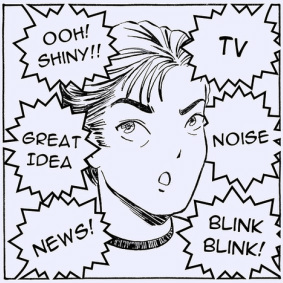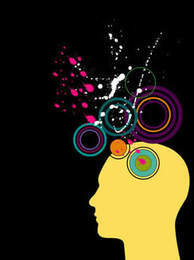ADHD is associated with impairment of psychosocial functioning that goes beyond the core symptoms of Hyperactivity, Inattention, and Impulsivity. Some of the more pronounced symptoms in teens with ADHD are related to deficits in "executive functioning." Executive functioning refers to the functions within the brain that "activate, organize, integrate, and manage other functions". Stated differently, executive functioning allows individuals to foresee longer-term consequences for actions, plan accordingly, evaluate progress, and shift plans as necessary.(Barkley,R. 2010).

MOTOR DIFFICULTIES
The “H” in ADHD stands for Hyperactivity. Even though ADHD is not a physical disability, it does come with its own set of physical problems for your teenager.Hyperactive physical movements can cause your teenager to move around way too fast, and can disrupt their balance and coordination causing accidental injury to themselves or others.
The good news is that although hyperactivity is still present during adolescence, this symptom is often less prominent during this age period. Motor restlessness may become a more internalized sense of feeling a need to busy all the time.

SENSORY DIFFICULTIES
Adolescents with ADHD often have sensory processing issues. Often the information they receive through their senses is too much to handle. ADHD teens are most often hypersensitive to auditory, (what they hear) visual, (what they see) and tactile (what they feel) sensations, causing them to be distracted and lose focus on a task that they are trying to perform. Focusing in school, on homework, or at a job may be extremely difficult for your teenager to overcome. Sensory problems may also lead to difficulty in the way your adolescent communicates, because they often respond to sensations in a way that is not understood or distracting to others.
EMOTIONAL DIFFICULTIES

ADHD can cause your adolescent to have excessive problems with controlling emotions and responding appropriately to feelings.The relationship between parents and children with ADHD is associated with more conflicts and is considerably more stressful than the parent-child relationship in families without a family member affected with ADHD. (Barkley, R. 2010). Due to impulsivity, adolescents with ADHD often express their feelings in a very strong inappropriate way. Instead of being able to take a step back and come up with a response to a situation, teenagers with ADHD are likely to scream when their mad, cry loudly when they are upset, or even physically act out. They often take their frustrations out on anyone or anything around them. Impulsivity is the main cause of your teenager acting without consideration of the consequences of their behavior.
When adolescents with ADHD cannot control the impulsivity of their emotions at school, they can easily jeopardize relationships with their peers. They can alienate themselves quickly, which can lead to a lowered self concept and also depression. Adolescents often internalize behavior problems, which can also result in lowered self-esteem. (Houck, G. 2011). According to my research, I found that young children with ADHD are at a high risk for both single and recurrent episodes of adolescent depression and for suicidal behavior. (Tuscano. 2010).
Emotional regulation skills are what allow your teenager to persevere through activities. Often adolescents with ADHD have problems mastering this, and exhibit a very low frustration tolerance. Inattention will cause them to give up easily when they are frustrated or tired. Sometimes they will just refuse to participate no matter what the consequence may be, especially if they can see no reward for completing the activity in their near future.
Emotional regulation skills are what allow your teenager to persevere through activities. Often adolescents with ADHD have problems mastering this, and exhibit a very low frustration tolerance. Inattention will cause them to give up easily when they are frustrated or tired. Sometimes they will just refuse to participate no matter what the consequence may be, especially if they can see no reward for completing the activity in their near future.

COGNITIVE DIFFICULTIES
ADHD teenagers often lack skills that are needed to organize, prioritize, and sequence activities. As explained above, they have "Executive Functioning Deficits". Due to their attention deficits the adolescent with ADHD will often have trouble focusing on what needs to be done, and when to do what. During adolescence disorganization prevails, and for these teenager's with ADHD steps and orderly ways to perform an activity become increasingly difficult. Often these teenagers have major issues with initiating (starting), planning, managing, carrying out, or completing an activity.
That makes daily life HARD!
Unfortunately, more facts that I discovered about impulsivity in adolescents with ADHD often relates to non-academic impairments, such as drug experimentation, speeding while driving, engaging in risky sexual behaviors, and taking on excessively dangerous dares from peers. Their impulsivity causes them to not weigh the risks of their actions. The symptom of inattention can also result in driver impairments, causing poor attention to traffic density and speed limits, putting them at a greater risk for car accidents. Inattention can also cause your child poor follow through on chores and other responsibilities at home, and sub-standard work performance in employment settings. (Barkley, R. 2010).
ADHD teenagers often lack skills that are needed to organize, prioritize, and sequence activities. As explained above, they have "Executive Functioning Deficits". Due to their attention deficits the adolescent with ADHD will often have trouble focusing on what needs to be done, and when to do what. During adolescence disorganization prevails, and for these teenager's with ADHD steps and orderly ways to perform an activity become increasingly difficult. Often these teenagers have major issues with initiating (starting), planning, managing, carrying out, or completing an activity.
That makes daily life HARD!
Unfortunately, more facts that I discovered about impulsivity in adolescents with ADHD often relates to non-academic impairments, such as drug experimentation, speeding while driving, engaging in risky sexual behaviors, and taking on excessively dangerous dares from peers. Their impulsivity causes them to not weigh the risks of their actions. The symptom of inattention can also result in driver impairments, causing poor attention to traffic density and speed limits, putting them at a greater risk for car accidents. Inattention can also cause your child poor follow through on chores and other responsibilities at home, and sub-standard work performance in employment settings. (Barkley, R. 2010).
Impaired planning and preparatory behavior are likely to result in the adolescent not being ready for their future in adulthood. Future rewards are sometimes less valued by adolescents with ADHD due to impulsive thought patterns. Adolescents with ADHD prefer “instant gratification” rewards. The delay of rewards to be obtained in a future that feels so far away can cause teenagers with ADHD not to pursue future goals.
To further define this problem, research I found states that “Children and adolescents with ADHD complete fewer years of school, graduate from high school at a lower rate, and are less likely to enroll in graduate school. Older adolescents and young adults with ADHD tend to underperform in both educational and occupational settings” (Kelsberg, G. 2011). Instead of college these teenagers often opt for a minimum wage job right out of high school, or enroll in a certificate program that they can complete in less than a year. This will probably hurt them financially in the future. Even more important than an unsure financial future, is the possible jeopardy of our childrens satisfaction with life in adulthood. If our adolescents view continuing their education after high school as too difficult, they are likely to NOT pursue a degree in a career which they would find meaningful and enjoyable. Not only will these choices effect their overall "satisfaction with life", they could also lead to depression or decreased feelings of self worth in the future.
To further define this problem, research I found states that “Children and adolescents with ADHD complete fewer years of school, graduate from high school at a lower rate, and are less likely to enroll in graduate school. Older adolescents and young adults with ADHD tend to underperform in both educational and occupational settings” (Kelsberg, G. 2011). Instead of college these teenagers often opt for a minimum wage job right out of high school, or enroll in a certificate program that they can complete in less than a year. This will probably hurt them financially in the future. Even more important than an unsure financial future, is the possible jeopardy of our childrens satisfaction with life in adulthood. If our adolescents view continuing their education after high school as too difficult, they are likely to NOT pursue a degree in a career which they would find meaningful and enjoyable. Not only will these choices effect their overall "satisfaction with life", they could also lead to depression or decreased feelings of self worth in the future.
COMMUNICATION DIFFICULTIES

Problems with social interaction probably play a big part of your adolescents life, and you may not even realize it! Adolescents with ADHD have problems with peer relationships and lack friendships. These problems are a result of their inability to effectively participate in social exchanges such as turn taking, sharing, and cooperating. Adolescents with ADHD often interact with peers in a self centered, impulsive, and intrusive way.They tend to be disruptive of on-going social interactions of others, or will show off and clown around more in social settings.
Teenagers with ADHD also tend to express their anger and frustration more than others, and show reduced empathy and guilt. (Barkley,R. 2010). Your adolescent may have a hard time getting their points across to others, because of verbal impulsivity. They are just so quick to say things they don’t mean, without thinking things through. Impulsivity may cause your teenager to react aggressively to a situation that they are unhappy with, or when they are feeling misunderstood. Another possible social interaction problem is that your adolescent may be inattentive to other peoples’ wants, needs, or intentions. This will cause them to appear disinterested, respond, or behave inappropriately during situations, or to miss important details needed to follow directions to complete an activity.
